- Home
- Anne McCaffrey
Acorna’s Quest Page 7
Acorna’s Quest Read online
Page 7
Then they obviously were trying to extract from him her current location, showing him star maps and pointing urgently at them. They spoke all the time in their own liquid language, slightly nasal, as Acorna’s Basic was, but he was totally out of his depth. He’d always left navigation to his highly trained space crew and wished desperately that he had Rafik to hand just then.
A chance look at the timepiece showed him he had little time to fool with gestures and expressions. He compressed their interview into a message cube, slotted it in with the Uhuru’s code, and sent it off. No sooner had he done that than a great shadow seemed to float through the window and over his house. The Shield had been put in place.
Lost was any contact with the courier ship, and he could not be certain that the message had made it through that device and on to Rafik.
“Well,” Misra’s acid voice now violated his ears, “did you find out anything?”
“If I did, that damned Shield, ten thousand djinnis fly away with it and drop it into the hell of molten rock, may have prevented it getting through to where this information will be most valuable. Rafik HAS to have that information.”
“They call themselves Linyaari,” Misra said with that odiously superior tone he so often adopted. “We know their planet of origin, but it has been totally destroyed by these invaders whom they call the Khleevi. They have reestablished a home world only to be forced to run again from these…these things. They thought to warn us, and they have other couriers doing the same task in the hope of finding some group strong enough, or militaristically advanced enough, to overcome the threat the Khleevi so obviously are. Let me remind you that all communications would now cease even if the Shield were not in place, in case these…predators…have equipment able to detect even planetary-based signals.”
“That,” Hafiz said, “could prove as expensive as not having the Shield at all.” No communications meant no trade, and how long could Rafik carry all the burdens of House Harakamian’s multitudinous business schemes by himself? Not only that, but he would be absolutely unable to complete some agreements without Hafiz’s personal authorization, and there were others he had not been told of…. Well, the boy had already proved his worth as heir to House Harakamian; he wouldn’t be a worthy heir if he didn’t have, somewhere, a source of information about ALL the House’s business plans, as well as a code key that would allow him to forge his uncle’s authorization. In that sense at least, one could always trust one’s family…. But to do exactly what? Rafik couldn’t protect Acorna and manage Hafiz’s business simultaneously. Hafiz paced his study and could not decide which choice would cause him most distress.
Rafik was somewhat surprised to receive a message from his uncle, who should know that the Uhuru was already orbiting Laboue and that Rafik would be reporting in person shortly. The message had obviously suffered some damage in transit, and the only word that came through unmutilated was “Acorna’s…”
Rafik fired off a request for a repetition of the message while he waited for confirmation of his first message, requesting permission to land.
The com board gave a warning beep; Rafik glanced over to see that his second message had been returned as undeliverable. There was still no response to the first one…and a new series of beeps alerted him to the possibility that there would be none. Laboue’s main communications satellite had stopped transmitting. “Check alternates, display visuals, trace,” Rafik snapped, and the visual-display screen came up showing a sphere of cloudy gray, to all appearances completely enclosing the green planet where he had just been preparing to land. The test of alternate communications routes returned a null; apparently none of the backup satellites was transmitting or receiving messages either. The red tracer line that showed the futile progress of his communications burst from one possible node to another also showed a strange ship, one whose beacon signal, if any, was unknown to the Uhuru’s computer…and Rafik would have sworn that his uncle Hafiz had access to every ship-recognition code, registered or unregistered, in known space.
What sort of threat had that little ship posed, to make Hafiz take the unprecedented step of shutting Laboue off from the rest of the universe with the Shield? Should he stay and try to help from here? After a moment’s agonizing debate, Rafik decided against it. He had every confidence in Uncle Hafiz’s ability to take care of himself. Besides, if this confidence should prove to be misplaced for once, Hafiz would surely not be pleased to see his heir run into the same noose that had captured him. And that garbled message had said something about Acorna…perhaps to warn of some danger threatening her? Clearly his duty was to return to Maganos Moon Base at once, to check up on Acorna, and once there perhaps to enlist Delszaki Li’s aid in finding out what disaster had cut off his uncle’s communications.
On board the Balakiire, joy and confusion almost overwhelmed the Linyaari envoys at this evidence that one had survived who had long been considered dead to them. They were not, however, so overset that Melireenya, the communications specialist, failed to copy and trace the single message that emerged before a shield impenetrable even to their sophisticated equipment blanked out transmissions from the planet below.
Among themselves they did not bother to speak aloud; after so many months of travel, the small crew were all perfectly attuned to one another’s thought-patterns, so that the rudimentary short-distance telepathic communication of their kind was even less effort than speaking.
(That pod was marked with the names of Feriila and Vaanye.) That was Neeva, Feriila’s sister, one of the two senior members of the envoy team. The hope that some member of her family might have survived had overpowered her emotions; her golden eyes were narrowed to vertical slits, and the gilt tendrils of her mane quivered in the still air of the ship.
(But we know they destroyed their ship rather than be captured by the Khleevi. How could one of the survival pods have come so far, to be in the possession of these barbarians?) Thariinye, young and beautiful and arrogantly male, prided himself on his unemotional analytical reasoning.
The thought-streams of the whole crew blended, coalescing and separating like partial conversations at a very crowded party.
(We don’t know they are barbarians. They may be perfectly civilized people.) The thought-shape that accompanied this concept was of a group of hornless unicorns with flimsy, soft hands and feet. If Khaari had been speaking, the words that went with this thought-shape would have been “people like us.”
(Then why won’t they treat with us? Anyway, they look like carnivores to me. Did you see those pointy side teeth?)
(We still don’t know all the properties of the device Vaanye used to destroy the ship; his research notes went with him. But we can postulate it was developed as an offshoot of his research into space topology and transportation.)
(Who cares about the research! I want to find Feriila’s child!)
(Neeva, calm yourself. That they have a vid does not prove that they have the child, only that there has been some previous contact with our kind. The vid was of a young girl; it’s been three ghaanyi since the explosion; if Feriila’s youngling had lived, she would be fully grown by now.)
(My point about the research was, Vaanye said the new weapon worked by folding space to make two distant points contiguous, but there were still a few minor problems to be solved.)
(So?)
(So maybe what he meant by “a few minor problems” was that objects close to the fold might be unpredictably transported to an unknown distant point. Physicists think like that, you know. And when he used his experimental weapon to blow up his ship and the Khleevi attackers, maybe as a side effect, the youngling’s escape pod was transported into this sector.)
(A lot of “maybes” there.)
(Okay, you explain how they got hold of a pod from a ship that was supposed to have been destroyed down to the molecular level three ghaanyi ago.)
(I’m sure she survived. I’m sure of it. The barbarian was holding his hand up to show us how much she�
��d grown. And that word he kept saying—“Acorna”—that must be what they called her.)
(“Acorna”? That word was in the transmission that was sent just before the Shield closed down. It was the only signal I picked up clearly. But it was enough to send that neighboring ship out of orbit.)
(Can we follow it?)
(Of course we can, if Melireenya will give me details of the ship’s signal. I didn’t get this for nothing.) Khaari tapped the crescent-shaped silver medal that proclaimed her a senior tutor in the Navigators’ Guild.
(Might as well do so, then. It certainly doesn’t look as if we’re going to get any more out of this lot of barbarians. Why did you have to scare them with those vids of Khleevi tortures, Melireenya?)
(Me? I like that! It was your idea to start with vids instead of first collecting enough samples of the language to run the LAANYE, Thariinye!)
(Well, they’re scared now, no matter whose idea it was,) Neeva interposed pacifically. (We’d better cloak the ship; if this one notices us following, he might think we have hostile intentions toward him.)
(Why don’t we just capture him for our language sample?)
(Thariinye. I. Want. To. See. Where. He. Goes. All right?)
Thariinye’s handsome young face flushed dark, and his silvery pupils narrowed to slits at Neeva’s scolding tone, but he realized the justice in it. His attempt at first contact with the barbarians had failed miserably. In the democratic fashion of the Linyaari, it was now Neeva’s turn to take the lead, and he was obliged to support whatever decisions she made in her own attempt to initiate contact—even if those decisions did seem to him, as now, to be excessively guided by personal concerns.
To be even more than fair, Thariinye reminded himself that a possible missing one of the Linyaari should be of the greatest importance to them all. It was just coincidence that this particular one, if she lived, might turn out to be Neeva’s sister-child.
All the same, he felt embarrassed both at his failure and at this public reprimand, and was eager to distinguish himself before the older envoys; a desire which was to cause far more trouble than this brief squabble on board the ship.
Cloaked and shielded, the Balakiire followed Rafik’s Uhuru at a discreet distance, a momentary darkness in space that hovered always in the other ship’s blind spot. For fear of alerting their quarry, the Linyaari shut down transmissions with their home base, difficult in any case at this great distance from the civilized world; but within the ship, they discussed their next step endlessly until everybody’s thought-patterns converged by minute increments onto the same plan. They had been mistaken to try and skip the language-acquisition phase of initiating contact with a new people; this would, therefore, have to be their first priority after they discovered the other ship’s destination.
For many generations the Linyaari had relied more and more upon their late-evolving telepathic abilities and less and less upon spoken language, except as a way of communicating with younglings whose brains were not yet mature enough for thought-speech. Only when they first came into contact with other races did they discover the problem presented by their total inability to make thought-contact with Others who showed signs of being as “linyarii,” in their own way, as the Linyaari themselves. With highly advanced technology but no experience in learning second languages, they had taken the obvious step of devising a learning device that, given a sample of an alien language, could be used in a few overnight sleep-training sessions to connect the forms of that language with the thought-forms of basic Linyaari communication. The device did have the one minor drawback—that it was necessary to establish some rudimentary dialogue with one of the aliens first, as a basis for further learning; and they had learned through experience that it could be extremely difficult to get cooperation before proper communication was established. The nesters of Khorma V had been sedentary creatures, the adults bonded to their nests by a complex set of chemical interactions. That first translation task had been easy enough; the Linyaari envoys needed only to camp beside a large nest and wait until the inhabitants grew curious enough to begin interaction. But the scurrying little dharmakoi of Galleni had been shy, easily frightened little creatures with a unique ability to disappear into shadows. The Linyaari had slowly established trust over a long period of cautious contacts, until the dharmakoi learned that not all Others were predators and came trustingly to converse with the large horned ones…a lesson the Linyaari now regretted teaching them, since the dharmakoi had greeted the first Khleevi with the same trust and hence were now extinct.
Memories of the time it had taken to gain the trust of the dharmakoi had inspired Thariinye’s suggestion that they initiate contact with vids from Khleevi torture ships, showing these barbarians what a mutual enemy they and the Linyaari had. At the time it had seemed like an excellent idea. Now they had returned to their basic contact methods, with a slight difference that was argued out while they followed the other ship.
(We don’t have time to spend months taming a barbarian. Besides, they are many, and we are only four—in this sector. What if they decide we’re dangerous and try to kill us? We have to establish communications right away,) Thariinye argued.
(I’m not even going to mention where I’ve heard that idea before, or what just happened when we tried it.) Neeva’s thought-images were accompanied by an emotion, or rather, by the haughty repression of all emotion; they seemed to float in a cold empty space.
(It wasn’t a total failure,) Melireenya pointed out. (We did learn that your sister-child may be alive and in this sector, Neeva.)
(I’m just saying that next time I’d like to have a little more meaningful dialogue and a little less hand waving, all right? It’s clear we can’t do anything until we have their language.)
(I didn’t say we don’t need the language, I said we don’t have time to sit outside their burrows and win their trust little by little, like the Second Envoys did with the dharmakoi.)
(So what do you suggest, Thariinye-always-in-a-hurry?)
(Isn’t it obvious? We’ll have to catch one. The one we’re following is handy.)
(That’s unethical! We can’t deprive a sapient being of liberty without its understanding and consent!)
(So we’ll calm it down until it consents.)
(Wait a minute, Neeva. Thariinye has a valid point. It could take a long time to win these barbarians’ trust…and they seem to have formidable weapons systems. If they are more khlevii than linyarii [more like vermin than like us, the People] then they might well exterminate us before we can even begin negotiations.)
(If they are so khlevii that they kill strangers who come to them peacefully, there’s no point in negotiating. Those are not the kind of allies we need.)
(Agreed, Neeva, but if you don’t terribly mind, I would prefer not to die finding this out!) Khaari thought with a wry twist of her mind that set all four Linyaari laughing in agreement.
(Perhaps if we could win the barbarian’s consent after we have captured and tamed it…?) Melireenya suggested.
(Bending our laws instead of breaking them, Melireenya?)
(Any good system must be flexible,) Melireenya stood up for herself.
(Hmm. Well…)
(We might want to use the barbarian as an envoy, too, rather than speaking with them directly. Just at first, while we’re finding out what happened to your sister-child. It might be better—if they think it’s one of their own people inquiring, then they won’t get scared and hide her.)
(You’re assuming a lot of cooperation from this captive barbarian whom we don’t even have yet.)
(If this people are at all linyarii, then surely every one of them will be happy to reunite a youngling with her family.)
(And if they aren’t?)
(Then it’s best we find that out first—even if it does mean bending the Linyaari code of ethics slightly. After all, our forebears who devised the code governing first contacts never envisioned encountering something like the Khleevi.)
<
br /> (I should hope not! Who could imagine anything like that?)
(But now that we know such beings exist, it is only rational to amend our code accordingly. Ethical interspecies contact should not require that we put ourselves into avoidable danger.)
(Ah, but which is more important—our danger, or the fear and anguish we shall inflict on this hypothetical captive barbarian who will have no idea what is going on?)
(We can dampen the fear and anguish.)
(Even if it were ethical to mess with its mind, we don’t know the effects we might have on its memory. This one may know something about our little lost one; we daren’t use it for a teaching tool.)
Eventually a compromise was reached. They would not attempt long-distance contact at first, but neither would they kidnap any members of this species. Nor would they approach whatever sentient beings were on the ship they were following, for fear that the necessary clouding of their minds would also cloud their memories of the desired information. Rather, they would ascertain the ship’s destination, then intercept and board some other ship headed for the same destination, relying on signs and whatever telepathic abilities this species might have to make it clear that they came in peace and meant to harm no one. If one of the barbarians on the ship would come with them willingly, they would use it for a language sample and maybe later employ its services as an envoy. If not, they would let the ship go on its way and try to think of some other stratagem. In either case, since they would be physically present on the vessel, they would have the power to heal any fear experienced by the barbarians during this brief captivity, as well as to blur their memories of the experience so that they would be hesitant to speak of it to others.
(What if we find we cannot heal this species?) Neeva fretted. (And even if we can, isn’t it just as unethical to fool with their memories as it is to take one of them captive?)
(Bend, not break, Neeva,) Khaari said firmly.

 The Renegades of Pern (dragon riders of pern)
The Renegades of Pern (dragon riders of pern) Dragonquest
Dragonquest Moreta (Dragonlady of Pern)
Moreta (Dragonlady of Pern)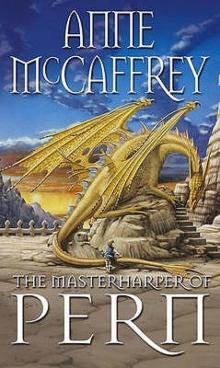 The Masterharper of Pern
The Masterharper of Pern If Wishes Were Horses
If Wishes Were Horses Dragonflight
Dragonflight No One Noticed the Cat
No One Noticed the Cat The White Dragon
The White Dragon A Gift of Dragons
A Gift of Dragons Harper Hall - Dragonsong
Harper Hall - Dragonsong Brain Ships
Brain Ships All The Weyrs of Pern
All The Weyrs of Pern The City and the Ship
The City and the Ship The Chronicles of Pern: First Fall
The Chronicles of Pern: First Fall Acorna’s Search
Acorna’s Search Powers That Be
Powers That Be Second Wave
Second Wave Chronicles of Pern (First Fall)
Chronicles of Pern (First Fall) The Kilternan Legacy
The Kilternan Legacy Decision at Doona
Decision at Doona Dragondrums (dragon riders of pern)
Dragondrums (dragon riders of pern) Dragonsinger (dragon riders of pern)
Dragonsinger (dragon riders of pern) The Master Harper of Pern
The Master Harper of Pern Crystal Singer
Crystal Singer Acorna’s People
Acorna’s People Pegasus in Flight
Pegasus in Flight Sky Dragons Dragonriders of Pern
Sky Dragons Dragonriders of Pern Dragonriders of Pern 4 - Dragonsinger
Dragonriders of Pern 4 - Dragonsinger Treaty at Doona
Treaty at Doona Damia's Children
Damia's Children Stitch In Snow
Stitch In Snow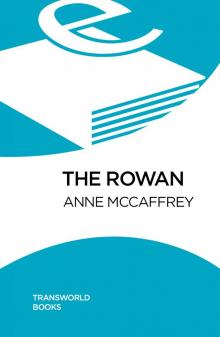 The Rowan
The Rowan Dinosaur Planet
Dinosaur Planet The Year of the Lucy
The Year of the Lucy The White Dragon p-4
The White Dragon p-4 Power Lines
Power Lines Catacombs
Catacombs Moreta
Moreta Dragonsinger
Dragonsinger Crystal Line
Crystal Line The Renegades of Pern
The Renegades of Pern Moreta - Dragonlady of Pern p-8
Moreta - Dragonlady of Pern p-8 Deluge
Deluge The Skies of Pern
The Skies of Pern Acorna's Quest
Acorna's Quest Dragon's Kin
Dragon's Kin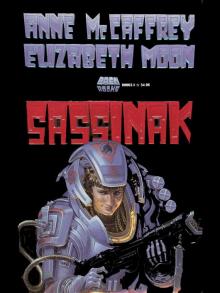 Sassinak
Sassinak![Crystal Universe - [Crystal Singer 03] - Crystal Line Read online](http://i1.bookreadfree.com/i1/03/31/crystal_universe_-_crystal_singer_03_-_crystal_line_preview.jpg) Crystal Universe - [Crystal Singer 03] - Crystal Line
Crystal Universe - [Crystal Singer 03] - Crystal Line Freedom's Landing
Freedom's Landing Acorna’s Quest
Acorna’s Quest Masterharper of Pern
Masterharper of Pern Restoree
Restoree Dolphins of Pern
Dolphins of Pern The Ship Who Saved the Worlds
The Ship Who Saved the Worlds Acorna's Triumph
Acorna's Triumph Acorna's Rebels
Acorna's Rebels![[Acorna 08] - First Warning: Acorna's Children (with Elizabeth Ann Scarborough) Read online](http://i1.bookreadfree.com/i1/04/06/acorna_08_-_first_warning_acornas_children_with_elizabeth_ann_scarborough_preview.jpg) [Acorna 08] - First Warning: Acorna's Children (with Elizabeth Ann Scarborough)
[Acorna 08] - First Warning: Acorna's Children (with Elizabeth Ann Scarborough) Dragonsong (dragon riders of pern)
Dragonsong (dragon riders of pern) Dragonriders of Pern 6 - Dragondrums
Dragonriders of Pern 6 - Dragondrums The Death of Sleep
The Death of Sleep Crisis On Doona
Crisis On Doona Nimisha's Ship
Nimisha's Ship Black Horses for the King
Black Horses for the King Changelings
Changelings Freedom's Choice
Freedom's Choice The Lady
The Lady The Coelura
The Coelura Catalyst
Catalyst The Unicorn Girl
The Unicorn Girl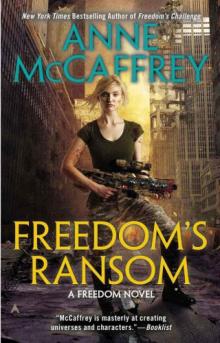 Freedom's Ransom
Freedom's Ransom Nerilka's Story
Nerilka's Story Dragon's Fire
Dragon's Fire Generation Warriors
Generation Warriors Lyon's Pride
Lyon's Pride Dragonseye
Dragonseye Dragon Quest
Dragon Quest Dragondrums
Dragondrums Dragonsong
Dragonsong The Mystery of Ireta
The Mystery of Ireta Dolphins' Bell
Dolphins' Bell To Ride Pegasus
To Ride Pegasus Power Play
Power Play The Dragonriders of Pern
The Dragonriders of Pern An Exchange of Gifts
An Exchange of Gifts The Ship Who Sang
The Ship Who Sang Sky Dragons: Dragonriders of Pern
Sky Dragons: Dragonriders of Pern Maelstrom
Maelstrom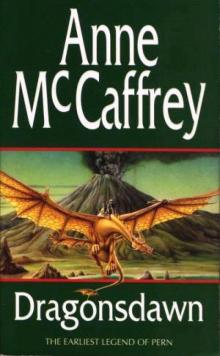 Dragons Dawn
Dragons Dawn Dragon Song
Dragon Song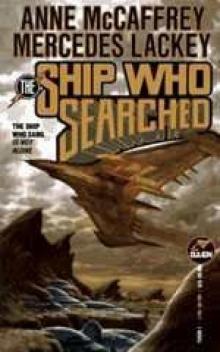 The Ship Who Searched b-3
The Ship Who Searched b-3 Damia
Damia Freedom's Challenge
Freedom's Challenge